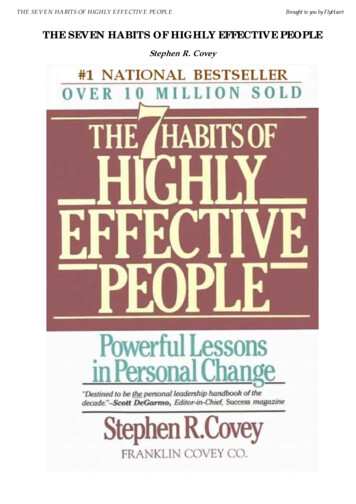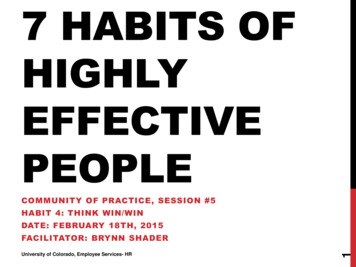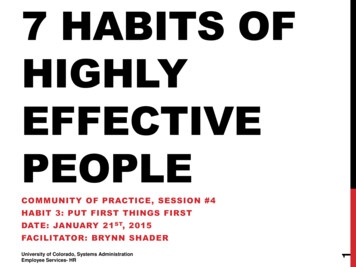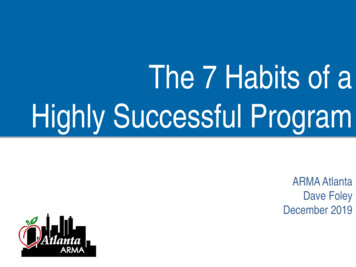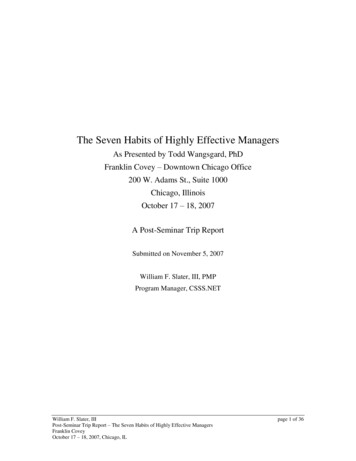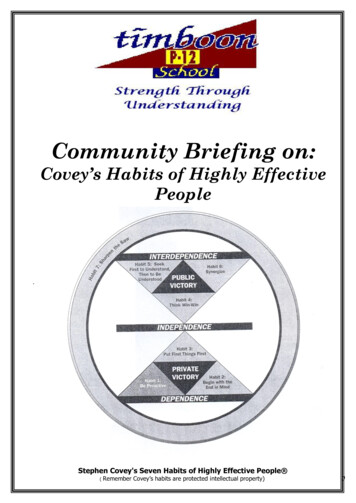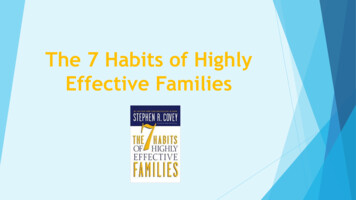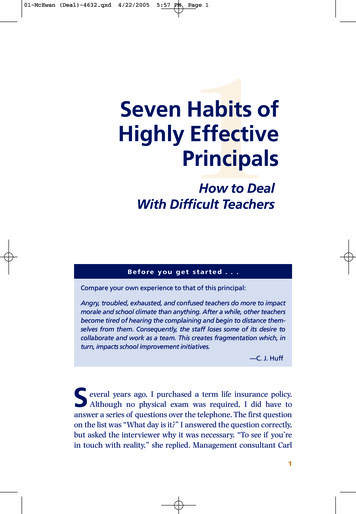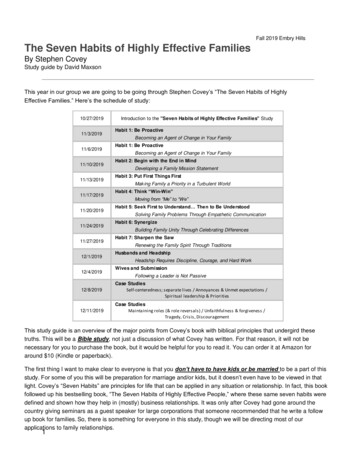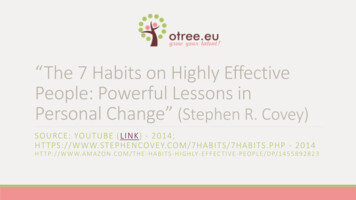
Transcription
“The 7 Habits on Highly EffectivePeople: Powerful Lessons inPersonal Change” (Stephen R. Covey)SOURCE: YOUTUBE ( LINK) - 2014;HT TPS://WWW.STEPHENCOVEY.COM/7HABITS/7HABITS.PHP - 2014H T T P : / / W W W. A M A Z O N .C O M / T H E - H A B I T S - H I G H LY - E F F EC T I V E - P EO P L E / D P/ 1 4 5 5 8 9 2 8 2 3
“7 habits” is not a quick fix program!The purpose is to learn to live your life in the most effective way, to achieve bothpersonal goals as well as professional goals.A habit is the intersection ofIntroductionWhat is the background of the 7habits?What are the 7 habits? knowledge (what to do?), skill (how to do it?) desire (wanting to do it?)7 habits are common sense, but mind that common sense is not always commonpractice!The development of the 7 habits is the result of a study (1976) of popular successliterature of the past 2 centuries, of which the basic finding was 150 years focus on character ethic (fidelity, respect, courage, service, etc.) Gradual shift to the personality ethic (techniques, technologies, etc.) (Model: “to seemrather than to be”) However lately (in advanced information age) pragmatic survival forces us to go back tothe character ethic!Inside out approach: first character, then techniques, this is the foundation of the7 habits!
Sequential and progressive nature of the 7 habits!The maturity continuum: dependence: in need of others to get what one wants, depend on YOU, YOUtake care of me, I blame YOU for this mistake, the “paradigm of YOU” independence: free of external influences; I can do it, I can choose, I amresponsible, the “paradigm of I” interdependence: think in terms of WE, we can be a team, we can combineour talents, we can co-operate, the “paradigm of WE”Mind: “Until you and I are independent, we cannot beinterdependent!”That’s why the first habits focus on leading us from dependence toindependence.
Sequential and progressive nature of the 7 habits!The first 3 habits character based, following them leads toindependence of the I1. Be Proactive2. Begin with the End in Mind3. Put First Things FirstSource: http://mybelieversguide.com
Sequential and progressive nature of the 7 habits!The next 3 habits work on the interdependence, WE4. Think Win-Win5. Seek First to Understand,then to be Understood6. SynergizeThe last habit7. Sharpen the saw, is the habit of continuous improvement
Summary5. Seek FirsttoUnderstand4. ThinkWin-Win6. SynergizeInterdependenceleads to7. Sharpen theSawPublic Victory3. FirstThings First1. BeProactiveIndependenceleads to2. Beginwith theEnd in MindPrivate VictoryDependence
FoundationalConcepts for the7 HabitsPrinciples and ParadigmsEffectivenessRelationshipsSource: Google Search define “x”
Concept of a PRINCIPLE
Concept of a PRINCIPLEPrinciples are natural laws of effectiveness.Example: on a farm, first you need to work the land, sow the seeds, water the plants, pluck weeds, be patient and only thenone can harvest the crops. A farm is a natural system governed by principles.All 4 dimensions of a human being aregoverned by Principles!SpiritualPhysicalMentalEmotionalWe are not in control! Principles are in control! So if we accept that principles aredetermining the outcome of our actions, then – if we follow all principles – weare in control!Example: Give a man a fish and you feed him for a day, but if you learn him howto fish, you will feed him for years.Key is to align our Values, our Habits and our Behavior with Principles!
Concept of a PARADIGM
Concept of a PARADIGMA paradigm is a thought pattern a mental image of how the things are, an image which is determined andinfluenced by our social background we see the world the way we think it is, in our “frame of reference”A paradigm shift can greatly influence our attitude (how we seethings / how we feel about something) and behavior (what we do).Therefore we should focus more on changing the paradigm ratherthan changing the attitude or behavior.Example: the man with the disturbing children on the tube .
Concept of EFFECTIVENESS“being highly effective”
strated/Concept of EFFECTIVENESS“being highly effective”Definition: first get what you want, then get what you want ina way that you can get it over and over again.P-PC balance: balance between Production (desired results)and Production Capability (ability to produce it in asustainable way)Ex. Maintenance of our body, lawn mower, car, marriage relationshipEx. Popular and successful restaurant, management changed,lowered the quality, short term increasing the revenue,however ultimately lowering the loyalty of the customerand in the end go bankrupt!http://saturdaybriefing.outrigger.com
Concept of RELATIONSHIP
Concept of RELATIONSHIPRelations are the emotional bank account, acontinuous relationship requires many, many, manypositive deposits, but be aware of withdrawals!
Concept of RELATIONSHIPTry to trulyunderstand a personto be able to knowwhat a valuabledeposit is for thatperson in his frameof reference
Concept of RELATIONSHIPMaking and keeping a Not keeping promises.promise to a person.Mind always carefullyconsider the costs ofpromises, because notkeeping promises isworse than makingcommitments)
Concept of RELATIONSHIPSimple ect, etc.Smalldiscourtesies,unkindness,disrespect, etc.;With theemotional bankaccount, small isbig and big issmall!
Concept of RELATIONSHIPClarifying expectations;define clear roles and goalsAmbiguous expectations (iftwo people have differentexpectations, then this canquickly become a difficultsituation, especially whenpeople take the easyassumption that other peopledeliberately violate theirpromises.)
Concept of RELATIONSHIP“Be loyal to the absent”;always talk about people asif the person is present.If you want to retain thepeople present, be loyal tothe people absent!Bad mouth; duplicity,disloyalty“A double-minded person isunstable in all his ways”Mind: be aware that a lot ofpeople enjoy talking aboutother people’s weaknesses!
Socrates’ triple filter testDo you knowwhat I justheard aboutyour friend?NoNo, on thecontrary No, notreally Is what you areabout to tell meregarding my friendsomething good?Before telling meanything I'd like you totake a little test. Thetriple filter test. Haveyou made sure thatwhat you are about totell me is true?If what you want to tellme may not be true, isnot good nor evenuseful, then why tell itto me at all?Source: asp?ID 449Is what you want totell me about myfriend going to beuseful to me?
Concept of RELATIONSHIPGiving andreceivingfeedback!Mind always dothis in the form ofan I-message.
Concept of RELATIONSHIPShow patience andpersuasion, empathiclistening to get thingsdone.Use of power to makethings happen!This is a seriousviolation of relationship,Mind that patience is an it creates dependencyactive verb!from the other to you!
Concept of RELATIONSHIPAbility to apologize. Justify badbehavior,onlyWe shouldapologize halfconstantlyapologize because heartedly,insinceritywe constantlymake mistakes.
Concept of RELATIONSHIPLearn to forgive and Holding a grudge.forget.People do not easilyforgive becausethey expose theirvulnerability.
FoundationalHabits, leadingto PrivateVictoryHabit 1: Be Proactive1. Be Proactive2. Begin with the End in Mind3. First Things FirstSource: findingmemo.newmediaservices.com.au
Foundational Habit 1: “Be Proactive”Your life is a product of values, not of your feelings, a product of yourdecisions, not of external conditions! You are the creative force of your life You are the programmer of your futureAwareness that you have control if you take responsibility!(if you are response-able)Focus on the circle of influence!Opposite is to “be re-active”:Focus on the circle of concern!
Foundational Habit 1: “Be Proactive”Study of Dr. Viktor Frankl, an Austrian neurologist and psychiatrist aswell as a holocaust survivor.StimulusWhat happensto us?SpaceResponseHow we react!Source: 201307/dont-just-react-choose-your-response
Foundational Habit 1: “Be Proactive”Space stands for the power to choose our own response to anycondition, to anything that happens, no matter thecircumstancesSpace to some degree the response to the stimuli will affect the stimuli the freedom to choose our response, this determines our growthand happiness“Whatever your situation calls for, you will find creating ‘space’ isan incredibly powerful part of becoming the person you aspire to be.”Dr. Leslie Becker-PhelpsSource: 201307/dont-just-react-choose-your-response
Foundational Habit 1: “Be Proactive”Events / circumstances can be classified into not under your control under indirect control under your direct controlProactive people focus on the circle ofinfluence Be patient and persuasive and the innercircle will start to expand Have the courage to act upon your valuesRe-active people focus on the circle ofconcernCircle ofInfluenceCircle of ConcernNo concernExample: Ben, the Go-For guy
FoundationalHabits, leadingto PrivateVictory1. Be Proactive2. Begin with the End in Mind3. First Things FirstHabit 2: Begin with the End in MindThe Huck and Tom Technique:Imagine yourself hiding at your own funeraland listening in (like Huckleberry Finn andTom Sawyer).What would you want people to say?What do you think they would actually say?Your goal: to reduce the difference betweenthe two.Source: -to-clarify-your-dreams-and-goals/See also: https://www.youtube.com/watch?v wRbKDoyN5oc
Habit 2: “Start with the End in Mind”This habit is about the goal of our life. Our vision of the end. Thishabit is about personal and purposeful leadership.Ask yourself the question: “what is your life about?”This habit is about the blueprint for the house, first design then startbuilding.If habit 1 “Be Proactive” is telling us “You are the programmer ofyour own life”, then habit 2 is saying “write the program”.This habit applies to everything we do, privately as well asprofessionally!
Habit 2: “Start with the End in Mind”Define a powerful and personal missionstatement!A good mission statement should contain“vision” and “principles”.Vision is “What are you about? What is thiscompany about? What makes it so great!”Principles explain “How you will go about it?What does the company value?Writing a good mission statement requirespatience, openness, humanity, imagination,use of conscience, collaboration, etc.Source: te/
Habit 2: “Start with the End in Mind”Basic characteristics of a good Mission Statement: Timeless, situationless and changeless Write the mission statement as if nothing will change from now to the end Off course over time you will need to adapt your mission statement It should deal with Ends and Means It should deal with the 4 basic Needs Life Learn Love Legacy (spiritual meaning of life) It should be implicitly and explicitly clear to all
Habit 2: “Start with the End in Mind”Some no-no’s: Do not rush! Do not just announce a Mission Statement, but involve from thestart all people that need to follow the Mission Statement Don’t ignore your Mission Statement, but always act upon it!
Habit 2: “Start with the End in Mind”Remember when defining a Mission Statement, be patient!Realize that writing a Mission Statement is a creative, inspirationaland meaningful exercise, that leads to great motivation of all peopleinvolved and impacted by a great Mission Statement!A Mission Statement is a prerequisite for empowerment of the teamand makes micro management obsolete!A Mission Statement is your compass for difficult weather!
FoundationalHabits, leadingto PrivateVictoryHabit 3: First Things First1. Be Proactive2. Begin with the End in Mind3. First Things FirstSource: -paul-foreman/
Habit 3: “First Things First”This habit is about effective time management.If habit 1 “Be Proactive” is about the programmer and habit 2 “Beginwith the End in Mind” is about writing the program, then habit 3 isabout executing the program!Habit 3 is a test of your integrity! Can you walk by those first things?Can you show the discipline and commitment to live by those firstthings?Remember the relational paradigm:“always put people first”!
Habit 3: “First Things First”The paradigm of Time ManagementIt is a misconception that we can manage time! If it doesn’t work, let’s try to do it more efficiently,faster, maybe skips parts of the processthat do not seem to bring value, etc. Did you try to manage your problems,your issues at home with your wife or children alsoas fast as possible? Did it work out?Source: readytomanage.comActually what we should not try to manage time, but manageourselves!
Habit 3: “First Things First”The Time Management MatrixWe spend time along two dimensions:1. Urgency This is determined by the environmentThings which require your immediate attention2. Importance Value based principlesImportant are the actions and tasks that immediately contribute toyour Mission, Values and your high priority goalsNot practicing habit 2 “Begin with the End in Mind” then we wouldonly respond to urgent items!
Habit 3: “First Things First”The Time Management MatrixFact: management attentiongoes to quadrant 1 and 31Do it now!CrisesHigh urgencyInterruptionsPressing problemsProximate pressingmattersDeadline drivenprojectsSome MeetingsPreventionIrrelevant phonecallsSome reportHigh importancePlan to do it!2RelationshipbuildingUnimportant mailsPlanningPleasant activitiesPreparationTime wastersLow urgencySuppose that yourboss asks you to doa task from Q3?
13.10.2014 · Sequential and progressive nature of the 7 habits! The maturity continuum: dependence: in need of others to get what one wants, depend on YOU, YOU take care of me, I blame YOU for this mistake, the paradigm of YOU _ independence: free of external influences; I can do it, I can choose, I am responsible, the paradigm of I _ interdependence: think in terms of WE, we can be a team .
